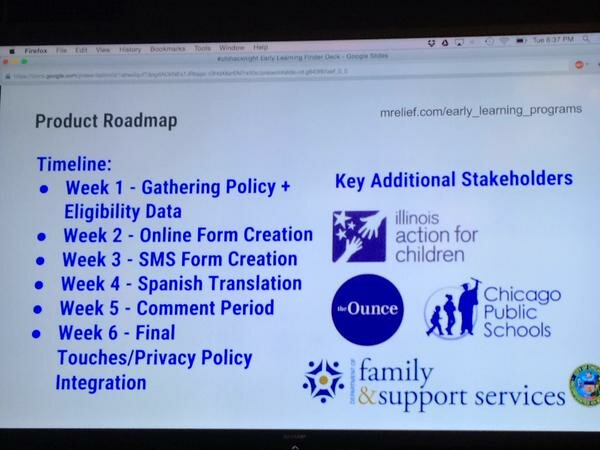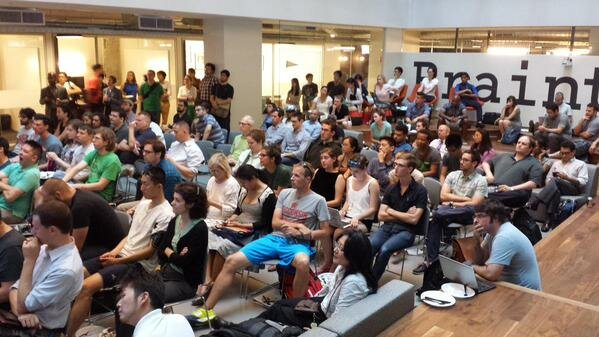 One of the defining characteristics of Chi Hack Night is how many people show up there on a regular basis. Chi Hack Night is now consistently reaching attendance numbers of 80 to 120 people and has featured speakers such as Chicago CIO Brenna Berman, WBEZ’s Linda Lutton, the University of Chicago’s Charlie Catlett and more. Currently there have been 173 hack nights and counting. Smart Chicago has been covering and supporting this growth from the get-go.
One of the defining characteristics of Chi Hack Night is how many people show up there on a regular basis. Chi Hack Night is now consistently reaching attendance numbers of 80 to 120 people and has featured speakers such as Chicago CIO Brenna Berman, WBEZ’s Linda Lutton, the University of Chicago’s Charlie Catlett and more. Currently there have been 173 hack nights and counting. Smart Chicago has been covering and supporting this growth from the get-go.
In a chapter I wrote for Beyond Transparency called, “Building a Smarter Chicago“, I briefly listed some of the key gatherings and efforts in Chicago that helped make us a center for civic tech. With some research help from Christopher Whitaker, I wanted to expand on that and write down what I knew about the history of such gatherings. Do you know something we’re missing? Hit us up at @smartchicago.
Before we started getting together, there was a group of people who just did stuff. Adrian Holovaty created chicagocrime.org in 2005. He later founded EveryBlock with help from the Knight Foundation. I joined as a co-founder and People Person (ya, I know). The work we did we — uncovering and presenting civic data and conversations in 16 cities— naturally put us at the center of things in the country.
There was lots of other activity. In 2005, I launched CTA Alerts to help riders communicate about issues with the CTA. In 2009, Harper Reed (who would later be the CTO of Obama for America) created an unofficial CTA API that set transit apps on fire in this town. There was even more action in the worlds of MCIC and other institutions and private consulting firms.
But this post aims to codify the history of civic technology and open governments groups in Chicago. It’s big, and incomplete, so bear with me and help me out.
The 8 Principals of Open Data
While this meeting didn’t happen in Chicago, one of the most important meetings of this movement occurred on December 7th, 2007 in Sebastopol, California. The meeting was organized by Carl Malamud and Tim O’Reilly with the goal of establishing principals of open data and with attendees including Lawrence Lessig, Tom Steinberg, Bradley Horowitz and more. The meeting had a significant Chicago presence including Adrian Holovaty, Dan O’Neil, Karl Fogel, and Aaron Swartz.
The meeting laid down the 8 Principals of OpenData, which would later help influence open data policies nationwide.
Independent Government Observers Task Force
One of the first open government events happened in Chicago on August 4th, 2008. The IGOTF Non-Conference brought together CEOs, professors, and nonprofit executives involved in placing case law on the Internet for free access. That meeting was productive in introducing players to each other in a series of cooperative efforts. EveryBlock People Person Dan O’Neil hosted the event and Omidyar Network, Sunlight Foundation, Google, and Yahoo! were sponsors.
OpenGov Chicago – April 2009
The OpenGov Chicago(-land) meetup group was founded in April of 2009 by Joe Germuska, who was an attendee of IGOTF. He asked me to help organize meetings. The group has one of the largest continuities google groups about open government in the country. Its first meeting on Meetup was a social event at Clark Street Ale House. The meetup group was created for citizens who are interested in seeing their federal, state, and local government function more efficiently and responsively. The group is inspired by people who are actively building tools and experimenting with solutions along these lines, like the Sunlight Foundation and GovTrack. The group stated right on the home page that it believes that open source software practices and internet culture provide good examples of how people can work cooperatively on complex problems to produce meaningful results, but you don’t have to be a techie to be part of this meetup.
OpenGov Chicago has always stated flat-out that you don’t have to be a techie to be part of the Meetup. I think that helped set the tone that the community here is open— we got so many different people from different walks of life.
Illinois Data Exchange Affiliates
One of the other early incarnations of open government groups was the Illinois Data Exchange Affiliates (IDEA). a voluntary coalition of government agencies and nonprofit organizations working to improve and facilitate public access to public data through web-based XML data transfer. Led by Greg Sanders and Justin Massa, the group met regularly and focused on institutions that worked with data.
CityCamp 2010 – Chicago
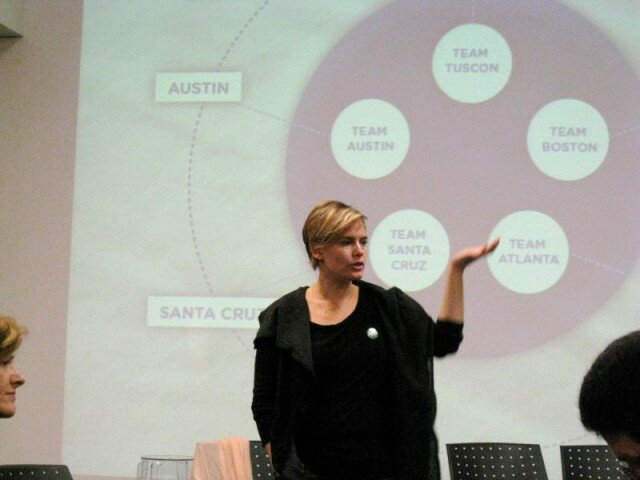
The very first CityCamp was held in Chicago in 2010 at the University of Illinois’ Chicago Innovation Center. CityCamp originally emerged from Transparency Camp and the Gov20 Camp. (Here’s a google doc featuring the meeting notes from that Transparency Camp that spawned CityCamp.)
At this meeting, Jen Pahlka presented about Code for America – an organization which would grow into a a massive international operation with countless people in its network and a ton of work.
CityCamp itself would also grow into its own brand with dozens of events happening around the world.
On a personal note, former Chicago Mayor Richard M. Daley wrote a letter of welcome to all attendees. That letter constituted my greatest opengov victory of the last mayoral administration— I took the train to get the signed letter from the mayor’s office on the way to UIC.
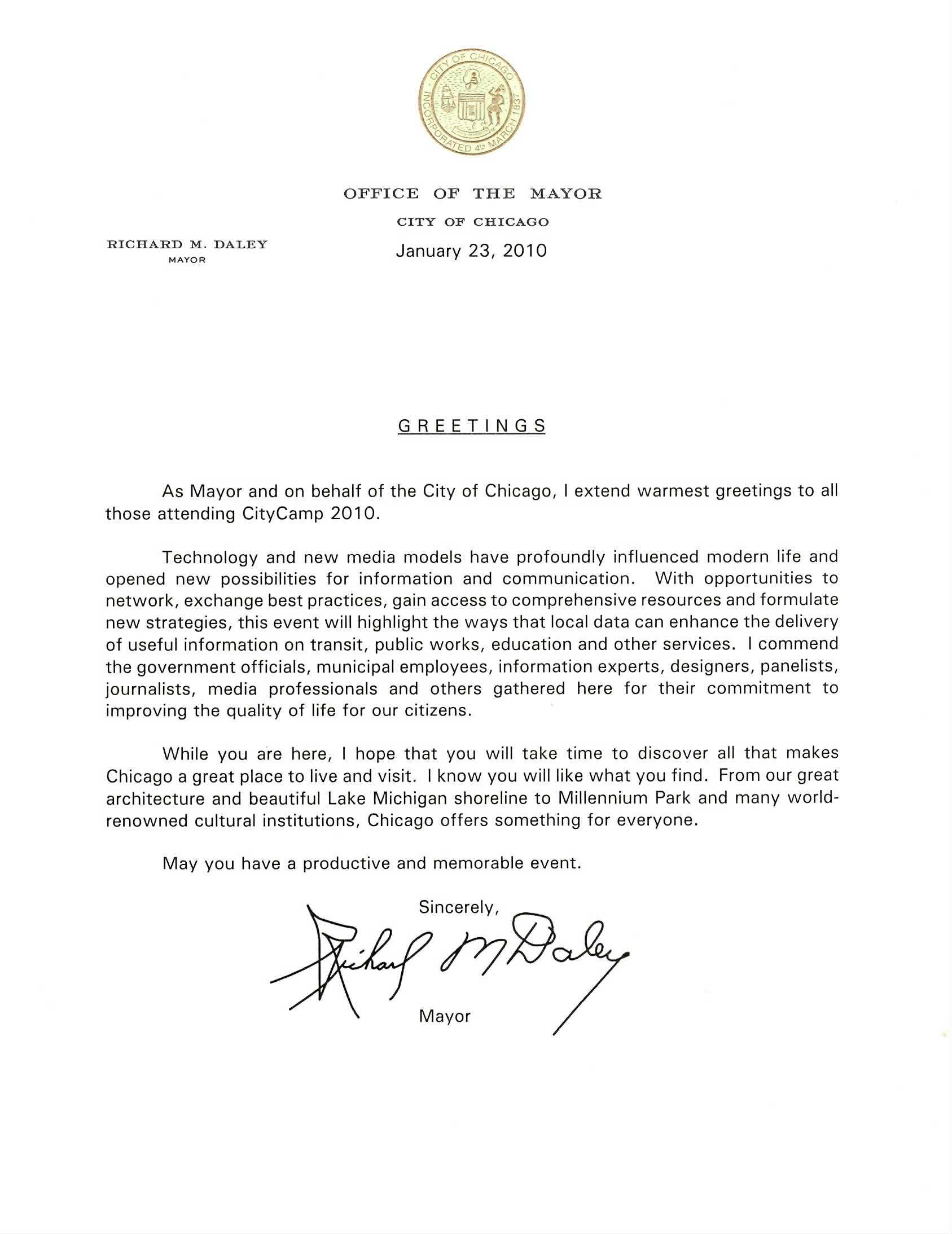
data.cityofchicago.org, Apps for Metro Chicago and Urban Geek Drinks
With the election of Rahm Emanuel as Mayor of Chicago, and the national acceptance of open government data pretty much a settled matter, the pace began to change quickly. One of the Mayor’s first acts was to sign an Open Data Executive Order that set the city on the path to opening up their data. John Tolva was hired as the city’s first Chief Technology Office and Brett Goldstein was hired as the city’s first Chief Data Officer. The Department of Innovation and Technology not only published data to the portal, but they hooked up their business systems directly to the portal so that data sets would update automatically.
Brett Goldstein recruited people from the OpenGov Chicago meetup and other technologists to form the “Nerd Herd” – an informal group of people who would meet regularly to talk about technology issues affecting the city.
At the time, there hadn’t been many civic apps created in part because there was no data to fuel them. (You had to either get the data through a Freedom of Information Act or just create the data yourself.) As part of the city’s strategy, the City partnered with the Metro Chicago Information Center to run the Apps for Metro Chicago Contest to help kickstart projects that used newly opened city, county, and state data.
As part of the year long event, MCIC held several hackathons at Google’s Chicago headquarters. The content would inject a lot of energy into the community and resulted in the creation of 52 civic apps. The winner, SpotHero, has gone on to become a major Chicago startup and recently just completed a $20 million dollar funding round.
The other big event that was happening at this time was an informal monthly gathering hosted by Justin Massa called Urban Geek Drinks. The venue provided an enormous networking opportunity where people with an interest in civic issues and technology could meet and talk.
Code for America Fellowship, Connect Chicago, and OpenGov Hack Night
In 2012, Chicago became a Code for America Fellowship City with the task of creating an Open311 interface for the City of Chicago with Smart Chicago Collaborative providing funding. At the same time, Smart Chicago was helping to administer the city’s Broadband Technology Opportunity Grant and starting to host the Connect Chicago Meetup for people interested in closing the digital divide in Chicago.
Post Apps for Metro Chicago, there continued to be an interest in civic hackathons including two “Idea Hack Chicago” events hosted by Veronica Ludwig, Christopher Whitaker and Josh Kalov in partnership with Code for America as part of their fellowship year.
One of the teams that formed during the very first Google Hackathon for Apps for Metro Chicago contest was Open City – first founded by Paul Baker, Chad Pry, Nick Rougeux, Ryan Briones and Derek Eder. Their entry, Chicagolobbyists.org, was one of the first civic apps to make use of open data and had a great reception when released. The volunteer group had continued to build apps even after the contest, but found it difficult do complete work outside of their 9-5 jobs without experiencing hackathon fatigue. Derek Eder and Juan Pablo-Valez had an idea to create a weekly hack night event as a space to work on their projects.
On March 22nd, Derek Eder and Juan Pablo-Valez hosted the first OpenGov Hack Night at offices of Webitects. A few months later, Code for America would launch the Brigade Program that would strive to harness volunteer energy around civic technology. Christopher Whitaker applied and was accepted as the Chicago Brigade Captain with a plan to support existing work and try and network resources within the community.
At the same time, Whitaker joined Smart Chicago as a consultant and was paid to attend hack night and document the movement. At that point, Derek Eder had left Webitects to start his own civic tech development shop Datamade with Smart Chicago being their first client working on projects like the Chicago Health Atlas and Chicago Early Learning.
Over the next few weeks, OpenGov Hack Night would continue to grow and quickly outgrew the offices at Webitects. Through Smart Chicago’s founding membership at 1871, OpenGov Hack Night moved to the IMSA classroom where it would say for the next few years. (Smart Chicago would provide a number of keys to civic technologists over the next few years.)
Several apps that used data to tell stories about the city was featured in the Chicago Architecture Foundation exhibit “City of Big Data” which uses interactive displays to display different aspects of city data.
Over the next few years, OpenGov Hack Night would grow and serve as a model for groups around the country. The space would outgrow even 1871 and move to the offices of Braintree where they are now. As part of the move, they changed their name to Chi Hack Night to reflect caring about more than just open government. Chi Hack Night is now run by Derek Eder and Christopher Whitaker along with a volunteer leadership council with members running their own breakout groups within Chi Hack Night.
Fewer, but more focused hackathons
As regular gatherings of civic technologists became the new normal, it had the effect of reducing the number of hackathons. Instead of having one every weekend, there were fewer but more focused hackathons. Smart Chicago helped to run several of these particularly around National Day of Civic Hacking. Chicago’s early success at National Day of Civic Hacking would result in a partnership with organizing organizations like SecondMuse and Code for America to provide training material for newer communities.
Other such events included the Geeks Without Bounds “Everyone Hacks” event at Groupon. The hackathon, co-hosted by Chicago Women in Developers, was specifically targeted towards getting more women into the tech space. After the event, Chi Hack Night saw an increase in the diversity of it’s attendees.
Another event that’s grown over the years is the Center for Neighborhood Technologies Urban Sustainability Apps competition that connects coders, designers, and developers with community leaders and representatives to solve neighborhood problems.
A flowering of more
As the community has grown there have been other groups that have formed to help bring together people around the intersection of technology and civic lift.Smart Chicago has hosted Data Potluck at our offices at the Chicago Community Trust and early on at 1871 due to their membership there. Other great groups are the City Data Users Group, Maptime Chicago, the Chicago Data Visualization Group, and more.
Again, what are we missing? Hit us up.
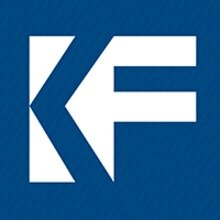 It’s Tuesday in Chicago, so that means #chihacknight. One thing that Hack Night attendees should consider is applying to the Knight News Challenge on Data.
It’s Tuesday in Chicago, so that means #chihacknight. One thing that Hack Night attendees should consider is applying to the Knight News Challenge on Data.


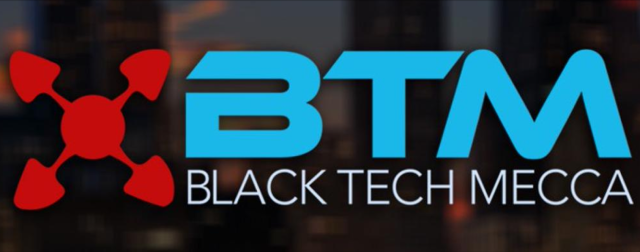 For the 172nd Chi Hack Night, Black Tech Mecca presented their plan to make Chicago a beacon in the black, tech, and global communities.
For the 172nd Chi Hack Night, Black Tech Mecca presented their plan to make Chicago a beacon in the black, tech, and global communities. At the last ChiHackNight, Yonah Freemark and Ryan Griffin-Stegink from the Metropolitan Planning Council gave a demonstration of Grow Chicago, a new website the Metropolitan Planning Council uses to advocate for transit-oriented development in the Chicago region.
At the last ChiHackNight, Yonah Freemark and Ryan Griffin-Stegink from the Metropolitan Planning Council gave a demonstration of Grow Chicago, a new website the Metropolitan Planning Council uses to advocate for transit-oriented development in the Chicago region.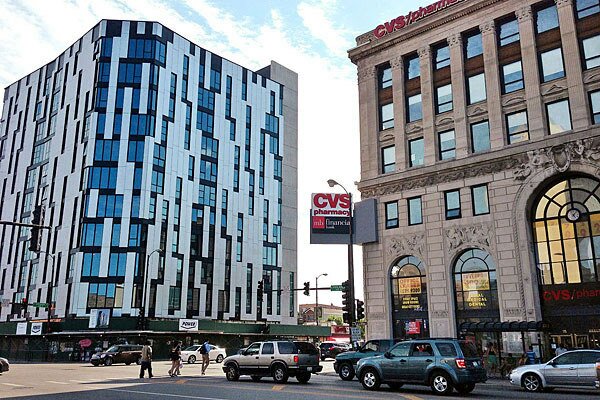
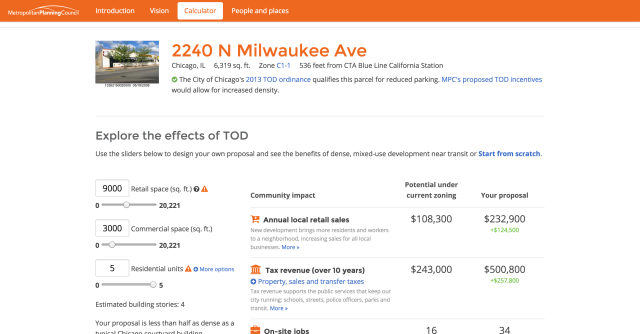 Even if you don’t have a specific address you’re curious about, you can use the app just to play around with any address.
Even if you don’t have a specific address you’re curious about, you can use the app just to play around with any address.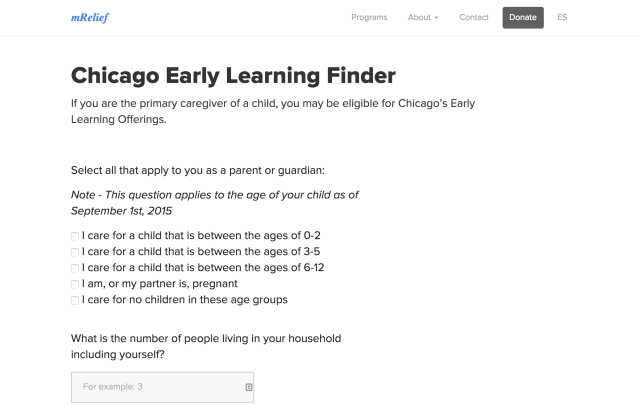 For the August 11th #ChiHackNight, mRelief, the City of Chicago’s Cara Bader and our own Sonja Marziano talked about the new Chicago Early Learning Finder.
For the August 11th #ChiHackNight, mRelief, the City of Chicago’s Cara Bader and our own Sonja Marziano talked about the new Chicago Early Learning Finder.